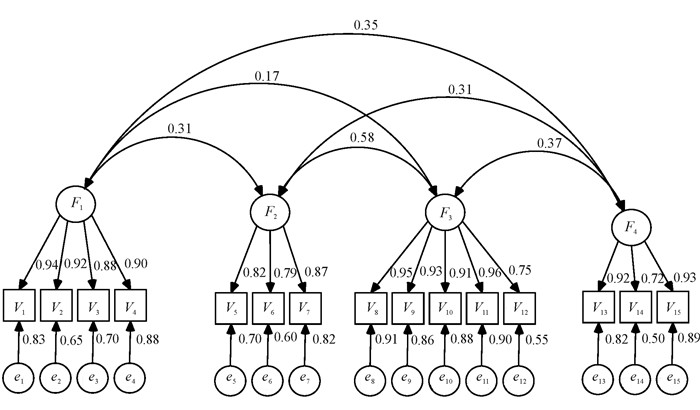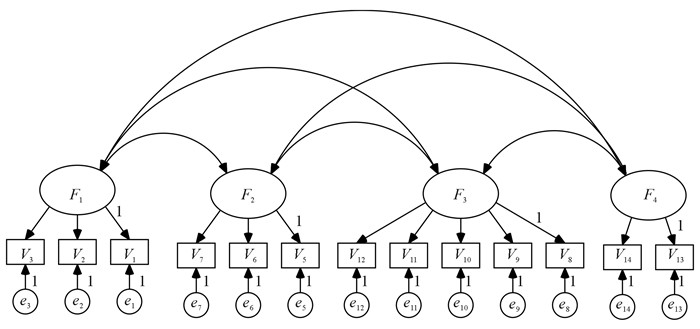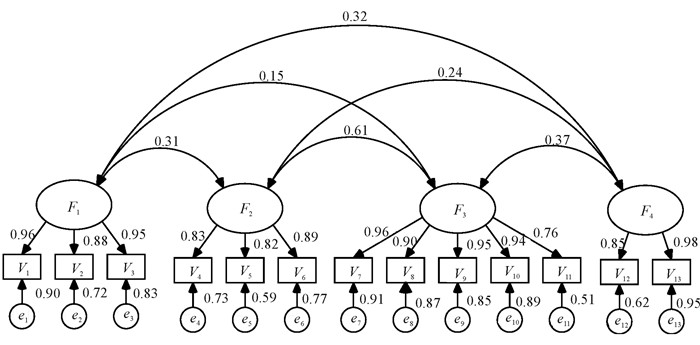全文HTML
-
教师的教学认识信念是指教师对知识性质和教学本质认识的个人信念,属于个体认识论研究的一个分支。
关于个体认识论的研究,人们关注的焦点是个体认识信念的结构、个体认识信念的发展以及个体认识信念的元认知取向[1]。前期的相关研究主要聚集于对知识本体的认识方面,例如,从知识的来源考察,知识是从前人的研究继承而来的,还是来自个人或社会经验与推理。Perry对哈佛大学等大学新生的认识论作了4年的跟踪研究。其研究表明,大学生的认识论存在9种不同的观点,并且“遵循二元论—多元论—相对主义—相对主义约定的顺序发展”[2]。Hofer从知识维度出发展开相关研究,并拓展了Perry的研究视角,认为个体认识信念由4个因素组成:知识的确定性、知识的结构、知识的来源、知识的辩护[3]。Schommer进一步扩大了认识信念要素范围,将信念与学习联系起来,提出知识的来源、知识的结构、知识的确定性、学习的速度以及学习的能力等5个要素,建立了认识信念的“五因素模型”,并编制了认识信念量表[4]。之后,Jehng等学者修订了Schommer的量表,用验证性因素分析证实了知识的来源、知识的确定性、学习的速度、学习的能力等4个维度的合理性,将“知识的结构”用“学习过程”取代,从而建立了由知识的确定性、知识的来源、学习的过程、学习的能力和学习的速度组成的“五因素模型”[5]。Schraw等学者也对Schommer的原始量表作了修订,形成包括28个题项的量表,并对2个量表进行了样本统计数据的比较与验证。他们得到的结论是:认识信念系统应该由知识的确定性、知识的结构性、知识的权威性、学习的速度、学习的能力等5个因素组成[6]。
除了研究认识信念的要素之外,Schommer更加关注认识信念的结构,即各要素之间是什么关系。他认为个体认识的多维信念是一个嵌入式的系统模型,包含6个相互作用的要素:文化相关信念、认识方式信念、知识的信念、学习的信念、课堂行为表现、自我调节学习[7]。显然,Schommer的研究涉及教师的教学认识信念。事实上,上述几位学者的研究都涉及教学认识信念。后来许多关于教学认识信念的研究基本上都是以这几种模型为基础而开展的。
So和Lee等采用Schraw的EBI量表,对学科背景不同的师范生进行测量,比较不同被试者教学认识信念的差异[8]。Deniz对小学职前教师作了实验研究,他以Hofer编制的“四维度量表”为工具对被试者进行前测和后测,通过研究发现在经过改变认识信念的干预后职前教师的认识信念会变得更加成熟[9]。Chen以Schomme认识信念“五因素模型”为基础,对231名实习教师的认识信念与其学习观之间的关系作了研究,发现两者之间具有高度相关性[10]。类似的研究还有Magno和Carlo的工作[11]。在对不同群体认识信念的差异性研究方面,Felbrich等就数学认识信念对15个国家的13 871名小学数学教育师范生作了比较研究[12]。Topcu以Hofer的认识信念“四因素模型”为基础,比较了生物、化学、物理等不同学科教师的认识信念差异[13]。也有对教师认识信念的现状作调查的相关研究,喻平构建了数学教师教学认识信念倾向性的“二维结构模型”,以教学认识信念为横轴、数学认识信念为纵轴建立一个平面直角坐标系,以此为基础编制量表用以测量数学教师的教学认识信念[14],并用这个工具对部分省市的中学数学教师进行数学教学认识信念调查。调查结果显示,数学教师的数学教学认识信念倾向由弱到强依次为:现代教学信念—相对论数学信念、现代教学信念—客观论数学信念、传统教学信念—相对论数学信念、传统教学信念—客观论数学信念[15]。
综观上述研究,可以看到学者们对教学认识信念的看法与界定是不完全一致的。虽然Schomme的理论比较系统,但是在他的嵌入式系统模型中,教学信念只涉及“课堂行为表现”,而行为只是信念支持下产生的结果,并不是信念本身,因此以这一理论为基础建构的教学认识信念系统具有一定片面性。本研究在对教学认识信念本质解析的基础上,对上述教学认识信念结构模型进行改造,对改造后的模型采用结构方程模型方法进行验证性因素分析,以此确定教师教学认识信念的基本结构。
-
关于教师认识信念有两种不同的说法,一种称为教师信念,另一种称为教师认识论。
教师信念是指教师对有关教与学现象的某种理论、观点和见解的判断,包括对教学目标、教学内容、师生地位、课堂形式、教学评价等多方面的认识[16]。有学者指出:“教师信念是教师自身确认并信奉的有关人、自然、社会和教育教学等方面的思想、观点、假设,是教师内在的精神状态、深刻的存在维度和开展教学活动的内心导向。包括教学目的信念、教学活动信念、教师角色信念、学科内容与自我学习信念、学习环境与教学模式信念、认知信念、教学效能感、自我效能感等方面。”[17]显然,这一观点比教师的教学信念更宽泛,是从教育层面对信念的描述。李学农认为:“所谓教师认识论,一般地说,就是教师在教学实践领域所涉及的关于知识的观念。这些观念影响教师的教学知识的发展,进而影响教师的教学专业实践。”[18]这个观点指的是教师在实践领域的知识观。
个体认识论信念主要是基于知识认识论逻辑,考察人们对知识本体的不同认识而形成的不同信念,其内涵比教师信念更窄。教师的主要工作是教学,因此教师的信念问题应聚焦教师的教学认识信念。一般认为,教学认识信念是指教师对“教”的认识信念,是教师对教学本质与过程的认识而形成的个体认识信念,这种信念往往是教师本人对某些理论的偏爱或确信,从而固化形成的教学观。对教学过程的认识,涵盖了对教学主客体关系、教学原则、教学设计、教学模式、教学策略、课堂管理、教学评价等多方面的认识。另一方面,教学涉及的对象是教师、学生、教材(知识),按照认识信念本身的含义,教师教学认识信念就应包括对知识的本质特征、教学的基本过程、学习的基本原理、学生的发展规律等多方面的认识而形成的个人观念。
基于这种认识,教师教学认识信念可以界定为:教师对知识的本质特征、教学的本质与过程、学生获得知识的过程及基本特征等方面的认识而形成的一个相对稳定的、带有一定“意动”成分的基本观点、态度和心理倾向。为了更加清晰地表达“学生获得知识过程基本特征”的认识信念,本研究将其分为“对学习的认识信念”和“对学生的认识信念”。对学习的认识信念指教师对学习本质的看法,对学生的认识信念指教师对学生心理发展及个体差异的认识。基于此,本研究认为教师教学认识信念包括4个主要成分:知识信念、教学信念、学习信念、学生信念。
本研究对教师教学认识信念的界定与Berliner等学者把教师信念主要归纳为5个要素的观点是基本一致的。他们提出的5个要素是:学习者和学习的信念、教学的信念、学科的信念、学习怎样教学的信念、自我和教师角色的信念[19]。不同的是,本研究把“学习怎样教学的信念”和“自我和教师角色的信念”作为“教学信念”的子因素,把“学习者和学习的信念”分解为2个因素,即“学习信念”和“学生信念”。
-
教师教学认识信念包括4个主要因素:知识信念(F1)、学习信念(F2)、教学信念(F3)、学生信念(F4)。这4个主要因素的详细分解见表 1。
-
本研究采用“传统—现代”认识观来反映教师教学认识信念的倾向性,以此作为编制量表的计分依据,其分值由传统倾向(例如绝对主义观念)到现代倾向(例如相对主义观念)逐步递增。这种做法在一定程度上可以解决信念测量的赋值问题,得分高的被试更具有现代观念,得分低的被试更具有传统观念,但得分反映的只是一种认识倾向而并没有高下之分。具体的做法是依据教育理论的发展、理论创建的时间和教育理论内容上的差异来划分出传统观念和现代观念。例如,“知识认知信念”,在客观认识论与主观认识论方面的根本区别在于认识知识是基于客观写实还是主观判断,传统倾向偏重客观主义,而现代倾向偏重建构主义。本研究对知识信念、学习信念、教学信念、学生信念这4个因素在认识倾向上都用“传统—现代”去描述和刻画,即每一个因素在认识信念的倾向性上是一个线性维度。
一. 教师教学认识信念的内涵
二. 教师教学认识信念的要素
三. 教师教学认识信念的倾向性
-
根据教师教学认识信念的主要因素框架,本研究编制了“教师教学认识信念结构量表1”。量表包括知识信念、学习信念、教学信念、学生信念等4个维度。知识信念包括10个题项,学习信念包括15个题项,教学信念包括33个题项,学生信念包括9个题项,量表共计67个题项。
每个项目均使用李克特4点记分法,根据教师教学认识信念的倾向性,1表示“很不赞同”,2表示“不太赞同”,3表示“基本赞同”,4表示“完全赞同”,分别赋值1分、2分、3分、4分,反向题目分别赋值4分、3分、2分、1分。
为了方便对量表作项目分析,本研究首先对所有初测数据进行编码和录入。将“教师教学认识信念结构量表1”的4个维度依次用字母K、L、P、S表示,同一维度之下不同项目分别在字母后加上序号1、2、3……以示区分,如K1表示知识信念维度下第1个题项,L3表示学习信念维度下第3个题项。
-
本研究选择199名被试,用“教师教学认识信念结构量表1”进行预测,根据预测数据作量表的鉴别度分析。(1)按被试所得总分由高到低排序,得分在前27%和后27%的被试分别作为高分组和低分组,然后对高分组和低分组在各题项的得分作独立样本T检验,如果在某个题项2组成绩存在0.05水平的显著性差异,表明此题项有很好的鉴别度,则保留此题项;如果在某个题项2组成绩不存在0.05水平的显著性差异,则删除此题项。(2)将全体被试在每个题项得分与他们在总量表的得分进行相关系数计算,若题项得分与量表总得分的相关性没有达到显著水平(p<0.05)就删除此题项。经过处理,量表共删掉不合适的题项10个(即L2,L10,P5,P12,P27,P30,S1,S3,S8,S10),于是量表中余下57个题项。
-
本研究将经项目鉴别度分析、修改后的初测项目混合编排成量表,请16名一线教师对量表初稿的适宜性及项目的可读性作出评价,并填写可读性评价表。评价表对每个项目采用李克特5点计分:完全明白、基本明白、不确定、基本不明白、完全不明白。数据汇总显示:“完全明白”占71.33%,“基本明白”占24.33%,“不确定”占3.33%,“基本不明白”占1.01%。本研究对可读性较低的项目,作了用词方面的进一步修改。
经过上述3个环节,本研究编制了包括57个题项的“教师教学认识信念结构量表2”。
-
课题组在江苏省分别选取小学、初中、高中教师共199名,其中小学教师52名(语文、数学教师数量分别为23名、29名),初中教师81名(语文、数学、外语教师数量分别为26名、31名、24名),高中教师66名(语文、数学、外语教师数量分别为21名、25名、20名)。课题组用“教师教学认识信念结构量表1”对199位被试进行测试,收回有效问卷199份,问卷回收率为100%。预测数据主要是对量表作项目分析。
-
课题组在江苏、广西、山西、浙江、广东、河南、四川等7个省选取高中、初中、小学教师作为被试。样本数据见表 2。
课题组用“教师教学认识信念结构量表2”对1 121位被试进行测试,收回有效问卷1 096份,问卷回收有效率为98%。
课题组在进行结果分析时所用数据是2组被试数据的合并,即正式测试收回的1 096个有效样本数据与预测的199个样本数据合并计算,因此其样本数合计为1 295。
一. 研究工具
1. 编制初测量表
2. 对量表作项目分析
3. 对量表进行可读性分析
二. 被试选择
1. 预测被试选择
2. 正式测试被试
-
根据预测和正式测试的有效数据,本研究运用结构方程模型方法,使用SPSS19.0和Amos19.0对“教师教学认识信念结构量表2”进行验证性因素分析。
教师教学认识信念结构包含知识信念(F1)、学习信念(F2)、教学信念(F3)、学生信念(F4)4个主要因子,其中:知识信念(F1)的观测变量有4个(设为V1,V2,V3,V4);学习信念(F2)的观测变量有3个(设为V5,V6,V7);教学信念(F3)的观测变量有5个(设为V8,V9,V10,V11,V12);学生信念(F4)的观测变量有3个(设为V13,V14,V15)。ei(i=1,2,3……15)表示对应变量Vi(i=1,2,3……15)的残差变量。本研究构建初始模型,对构建的初始模型进行数据载入,得到教师教学认识信念结构模型1(如图 1所示)。
载荷系数参数估计结果见表 3。模型评价主要考察模型结果中估计出的参数是否具有统计学意义,需要对载荷系数进行统计显著性检验。
表 3中的数据显示出很好的结果,载荷系数均存在非常显著的差异。例如,F1对V3的载荷系数为0.889,其C.R.值为7.792,相应的p值小于0.01,则可以认为这个载荷系数在95%的置信度下存在显著性差异。表 3列出了潜变量与观测变量的载荷系数,均达到0.05水平,呈现显著性差异,说明观测变量与4个潜变量有高度相关性。同时,计算显示(见表 4)潜变量之间的路径系数F2与F3呈现显著性差异,其余均未达到0.05水平,未呈现显著性差异,说明4个潜变量具有相对的独立性,反映了量表具有较好的结构。
-
本研究首先运用Amos9.0结构方程分析软件,对初始模型的数据进行拟合。初始模型的拟合指数并不十分理想,需要对初始模型进行适当调整。基于理论分析及修正指数的提示,对不合适的题项进行了转移、删除。具体地说,在“教师教学认识信念结构量表2”中删除9个题项,即删除第3题、第9题、第19题、第23题、第26题、第33题、第38题、第50题、第51题,最后保留48个题项,量表因素不变,从而得到正式的“教师教学认识信念结构量表”。
根据验证性因素分析原理,可以看到教师教学认识信念结构模型1是合理的模型,是适合数据的模型,但不能说明它就是最优的模型。基于理论分析,除了模型1之外,本研究还提出了2个具有竞争意义的模型(即教师教学认识信念结构模型2和教师教学认识信念结构模型3),然后从中选择最优模型。模型2:将学生智力发展信念与学生非智力发展信念合并为1个因素,形成教师教学认识信念结构模型2,即初始模型(如图 2所示)。
模型3:将知识属性信念与知识性质信念合并为1因素,将学生智力发展信念与学生非智力发展信念合并为1个因素,并重新命名,即V1指代知识性质,V2指代知识价值,V3指代知识结构,V4指代学习过程,V5指代学习能力,V6指代学习结果归因,V7指代教学本质与过程,V8指代教学目的,V9指代教学设计,V10指代教学操作,V11指代教学评价,V12指代学生智力与非智力发展,V13指代学生个体差异,从而形成教师教学认识信念结构模型3(如图 3所示)。
本研究对教师认识信念结构的3种模型进行拟合度检验(详见表 5)。由表 5可知,教师教学认识信念结构模型3的χ2、RMSEA、NFI、IFI、CFI等数据均优于模型1和模型2。因此,模型3是最优模型。
-
“教师教学认识信念结构量表”的信度分析结果见表 6。教师教学认识信念系统各因素内部一致性系数在0.659至0.912之间,总量表内部一致性系数为0.862。因此,量表的α系数信度指标基本达到了测量学要求。
通过验证性因素分析,说明教师认识信念结构量表有较好的建构效度。通过考察各因素之间的相关性,发现除了教学信念与学习信念达到显著性相关外,其余的组间相关性不显著(如表 7所示),表明各因素方向一致,但有所差异,不可互相替代。4个分量表与总量表之间的相关系数在0.419至0.912之间,均达到显著性相关水平或非常显著性相关水平,表明各分量表与总量表要考察的因素是一致的,并且还表明各分量表与总量表之间的相关性大于各分量表之间的相关性。
通过考察每一个子量表之间以及每一个子量表与其分量表的相关性,发现各子量表之间的相关性均小于它们与各自的分量表之间的相关性。因此,教师认识信念结构量表有较高的结构效度。
一. 验证性因素分析
二. 模型拟合评价
三. 信度分析
-
Berliner和Calfee提出的“五因素模型”[19],其中“学习者和学习的信念”,把对学生的认识和对学习的认识合为一体,其实这是2个不同的认识对象。在本研究提出的模型中,由图 1和图 2可以看到,学习信念和学生信念之间的相关系数分别为0.31和0.24,相关性并不高,它们应当是2个相对独立的要素。另一方面,Berliner和Calfee的“五因素模型”中提出的“教学的信念,学习怎样教学的信念,自我和教师角色的信念”,其中“学习怎样教学的信念”与教师教学认识信念的概念相距太远,而“自我和教师角色的信念”包含在“教学的信念”之中。因此,本研究修正了Berliner和Calfee的“五因素模型”。
许多学者(如Deniz[9]、Chan[10]、Topcu[13]等人)关于教师教学信念的研究主要是基于Schommer的模型[7]。Schommer的模型存在几个问题:第一,“认识方式信念”和“学习的信念”具有包含关系,因为学习是一种特殊的认识过程,所以这2个因素不应当相互独立;第二,教师如何认识学生在学习中的自我调节,这应属于教师对学生的认识信念;第三,“课堂行为表现”指的是课堂上教师的教学行为与学生的学习行为表现,并没有涉及教师对教学本质、教学目的、教学设计、教学评价等因素的认识,不应当属于“教师教学认识信念”范畴。因此,Schommer的“五因素模型”对教师教学认识信念结构的界定是有缺陷的。本研究在一定程度上弥补了已有关于教师教学认识信念结构研究的不足。
本研究采用结构方程模型分析教师教学认识信念的构成要素,编制“教师教学认识信念结构量表”,建构教师教学认识信念结构模型1,并进一步提出具有竞争意义的教师教学认识信念结构模型2和模型3。教师教学认识信念结构模型1由知识信念、教学信念、学习信念、学生信念4个成分构成。这4个成分的组成要素分别为:知识信念——知识认知、知识性质、知识价值、知识结构;教学信念——教学本质与过程、教学目的、教学设计、教学操作、教学评价;学习信念——学习过程、学习能力、学习结果归因;学生信念——学生智力发展因素、学生非智力发展因素、学生个体差异。通过分析对比教师教学认识信念结构模型1和模型3,发现知识属性信念与知识性质信念有共同要素,宜将其合并。对学生智力发展因素的认识信念与对学生非智力发展因素的认识信念都涉及对学生发展特征的认识,可合并为一个因素,得到模型3。模型3的基本成分为:知识信念(知识性质、知识价值、知识结构);教学信念(教学本质与过程、教学目的、教学设计、教学操作、教学评价);学习信念(学习过程、学习能力和速度、学习结果归因);学生信念(学生智力与非智力发展因素、学生个体差异)。检验结果表明模型3是最优模型。
本研究分析、验证了教师教学认识信念的结构模型。虽然图 1和图 3分别揭示了教师教学认识信念4个主要因素之间的相关性,但并未反映这些因素之间的相互作用关系。教师教学认识信念的结构体系有待进一步研究。
-
教师教学认识信念包括知识信念、教学信念、学习信念、学生信念等4个要素,形成一个相互联系又相对独立的结构。通过结构方程模型分析教师教学认识信念,得到模型1和模型2,并进一步提出模型3。在模型1中,知识信念包含4个子因素,教学信念包含5个子因素,学习信念包含3个子因素,学生信念包含3个子因素。在模型3中,知识信念包含3个子因素,教学信念包含5个子因素,学习信念包含3个子因素,学生信念包含2个子因素。竞争模型显示,模型3是教师教学认识信念结构的最优模型。
教师教学认识信念对教师的教学行为有很大的影响[20]。“教师教学认识信念结构量表”可以作为了解教师教学认识信念的诊断性工具,也可作为研究教师教学信念的测量工具。厘清教师教学认识信念的内涵、要素与结构逻辑,对教师的专业发展具有参照意义和积极的促进作用,有助于教师的专业培训、教师的自我教学反思以及教师认知结构的完善。




 下载:
下载:

